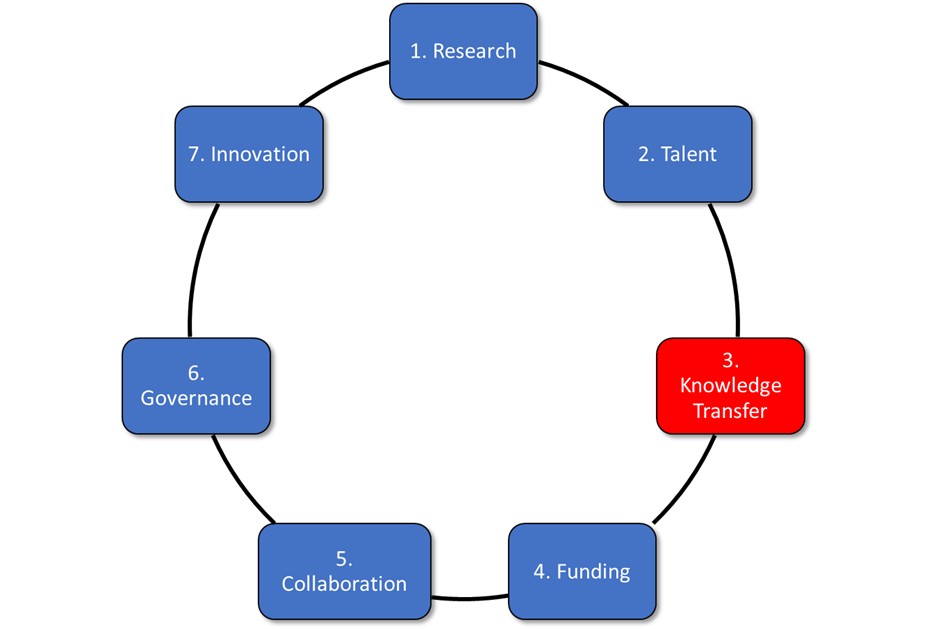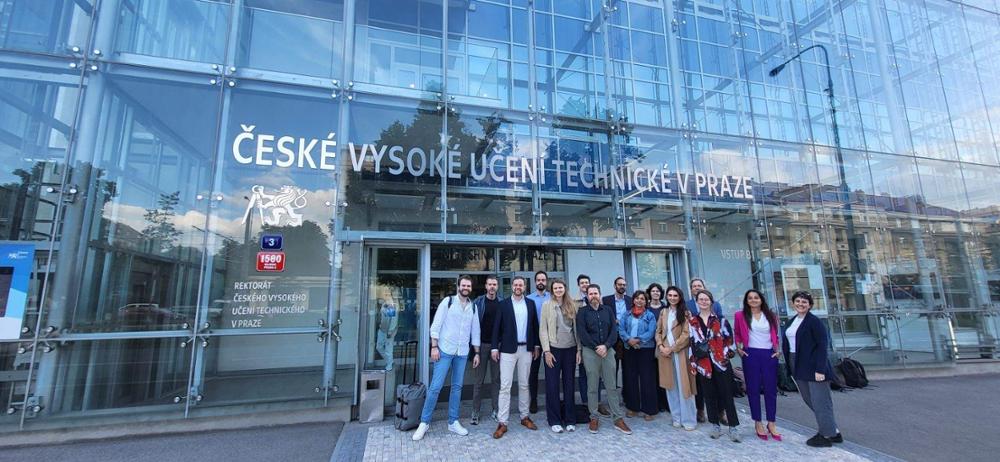| Hello Kevin, |
|
This is the COOPERATE newsletter with the latest information about the COOPERATE project, which during the next months (2022-2024) will define and pilot the ERA Hubs, one of the ERA policy actions defined by the Council of the European Union for the next years. Building on the vision and success stories developed within the EuroTech Universities Alliance and their R&I ecosystems, the COOPERATE partners will contribute to the future development of the ERA Hubs as a key European flagship to promote R&I ecosystems.
Follow the COOPERATE LinkedInpagina for the latest ERA-hub news.
|
|
Line of Action 3: Knowledge Transfer
|
|
COOPERATE aims to facilitate the harmonisation of research practices and sharing of best practices across member states, promoting a more seamless and efficient research environment within the ERA Hubs network. To aid ecosystem players such as educational institutions, local industry, policymakers, and other stakeholders, a framework for nurturing dynamic ecosystems has been developed in the so-called ‘Playbook’.
In each of the upcoming newsletter one of the seven lines of action will be further elaborated with concrete tools that can be employed by an ecosystem towards the implementation of the ERA Hub framework model. This edition: Knowledge Transfer.

In the context of the ERA Hubs framework, knowledge transfer plays a pivotal role in establishing and maintaining a strong research and innovation ecosystem. The effective exchange of knowledge not only accelerates the pace of scientific discovery and technological advancements but also fosters a culture of collaboration, dissemination, and entrepreneurship.
Efficient knowledge transfer is characterised by fostering trust among stakeholders, reducing barriers to entry, facilitating key account management, and employing engaging formats for knowledge exchange. The key points that characterise strong knowledge transfer in the ecosystem include:
- Trust: Trust is fostered through transparency, integrity, and accountability, including with the general public. When stakeholders have confidence in the credibility and reliability of the knowledge being transferred, collaboration and innovation flourish.
- Low barriers to entry: An ecosystem with efficient knowledge transfer will have inclusive and accessible knowledge transfer processes ensuring that a diverse set of stakeholders will benefit.
- Key account management: Effective key account management entails having dedicated personnel or teams that are responsible for managing relationships with key stakeholders, including researchers, industry partners, and investors. They serve as intermediaries, facilitating communication, identifying needs, and ensuring that the transfer of knowledge aligns with the goals and objectives of all parties involved.
- Engaging formats: Engaging formats of knowledge transfer are essential to capture the attention and interest of stakeholders.
The following recommendations can guide ecosystems towards improving and strengthening their knowledge transfer capabilities as part of the journey to become an ERA Hub. These suggestions centre on fostering an entrepreneurial culture, enhancing IP protection and trade, developing supporting policies, enhancing trust and cooperation between players both inside and outside the ecosystem, and raising public participation.
The key points that characterise strong knowledge transfer include:
- Foster a culture of continuous learning and collaboration
- Provide training and capacity building programmes for researchers and innovators
- Strengthen partnerships with industry, government, and non-profit organisations
- Implement effective communication and outreach strategies
- Cultivate an entrepreneurial ecosystem for commercialisation
- Promote international collaboration and knowledge exchange
- Develop robust infrastructure for efficient knowledge transfer
|
|
4th General Assembly in Prague
|
On June 4, 5 and 6, the partners of COOPERATE convened in Prague, at Czech Technical University for the 4th General Assembly. Another round of fruitful discussions about ERA hubs and ecosystem development, complemented by inspiring talks from Maarten Steinbuch from Eindhoven University of Technology and Jan Urban from Czech Technical University in Prague.

In the first week of June, the COOPERATE project consortium convened in Prague for the 4th General Assembly. Over the course of two and a half days, the project partners provided updates on the state-of-play of the project, engaged in discussions related to ERA Hubs, ecosystem development (and how to best support this through the COOPERATE project) as well as upcoming project activities such as the 'Call for Champions' – more information about this 'Call for Champions' will be shared in due course. The programme was complemented by inspiring talks from Maarten Steinbuch, distinguished professor at the Eindhoven University of Technology, and Jan Urban, Head of Commercialisation, Incubation and Fundraising at the Czech Technical University. Stakeholders from the Prague innovation ecosystem were invited and participated in an open dialogue to discuss the positioning of ERA Hubs in the local context. These reflections and input will support the further development of the unique proposition that ERA Hubs have to offer.
Beyond the technical agenda, our colleagues from the Czech Technical University showed us some of the highlights of the beautiful city of Prague, including the Czech Technical University Campus and the Bethlehem Chapel, the birthplace of the reformative movement which was rebuilt following its destruction in the 18th century.
A big thank you to our colleagues from the Czech Technical University for hosting us in the beautiful city of Prague!
|
|
Bridging the EU Innovation Divide: Combining Regional Strengths
|
The latest policy brief from the Directorate-General for Research and Innovation Expert Group on the Economic and Societal Impact of R&I (ESIR) sheds light on the structural factors contributing to the EU innovation divide.
The brief highlights that the concentration of innovation-critical factors like talent and funding in specific hubs is a hallmark of robust innovation ecosystems. However, this should not come at the expense of regions that lack the ideal conditions to develop such hubs. Instead, these regions should be supported to exchange and learn from innovation hubs through innovation-oriented smart specialisation strategies and value chain integration. This line of thought nicely overlaps with COOPERATE and ERA fabric who aim to strenghten innovation ecosystems and the construct of ERA hubs.
Moreover, the experts emphasize the importance of creating synergies with other policies, such as skills development and economic redistribution, to maximize the impact of R&I policies. These measures are crucial for a balanced and inclusive innovation landscape across the EU.
Read the full policy brief here: https://research-and-innovation.ec.europa.eu/news/all-research-and-innovation-news/combining-regional-strengths-narrow-eu-innovation-divide-2024-06-20_en
|
|
|
|
On June 25th, we had a productive COOPERATE co-creation session discussing the ongoing efforts to refine our ERA-hub approach to knowledge valorization and regional innovation ecosystems. Amongst others, we discussed:
Discussion Points:
- Validation and Feedback: Seeking validation of our definitions and feedback on knowledge valorization, core actors, and platform positioning.
- Industry Collaboration: Exploring how ERA hubs can foster synergies with industry while maintaining a focus on research valorization.
- Central Nodes and Ecosystems: The role of central nodes in managing knowledge valorization networks and ensuring effective collaboration.
- Added Value and KPIs: Identifying KPIs to measure the effectiveness of ERA hubs and the added value they bring to regional ecosystems.
Action Items:
- Further refine our definitions and concepts based on feedback.
- Develop a coherent narrative to better address recurring questions and concerns.
- Prepare for upcoming meetings and next steps, including monitoring, recommendations, and a whitebook.
|
|
The European Research Area (ERA) and Fourth-Generation Universities
|
The article " The Fourth-Generation University: The New Era of Open Innovation and Ecosystem Thinking " (published in the Holland Management Review and now translated into English) by Marcel Bogers and Maarten Steinbuch highlights the emergence of the fourth-generation university (4GU) model, emphasizing open innovation and ecosystem thinking. This paradigm shift aligns closely with the objectives of the European Research Area (ERA), which seeks to foster a unified and efficient research ecosystem across Europe.
The transition to the 4GU involves a shift towards open innovation and regional innovation ecosystems. This model encourages universities to cross traditional boundaries, collaborating actively with industry, government, and society. This aligns closely with the ERA's objective to create a more open and competitive European research landscape. By fostering collaborative networks and integrating various stakeholders, the 4GU model promotes the kind of cross-border cooperation and resource-sharing that the ERA aims to achieve.
The concept of regional innovation ecosystems is central to the 4GU. By embedding universities within their regional contexts and fostering strong local partnerships, the 4GU enhances the relevance and impact of academic research. This regional focus is in line with the ERA's aim to strengthen Europe's research and innovation capabilities at the local level, ensuring that all regions can contribute to and benefit from the knowledge economy. The example of Eindhoven University of Technology (TU/e), as highlighted in the article, demonstrates how such an approach can drive regional development and innovation.
The COOPERATE project, which aims to foster cooperation among European universities, research institutions, and external partners, is strongly aligned with the 4GU principles. By promoting open innovation, regional collaboration, and stakeholder engagement, COOPERATE can enhance its impact and support the ERA's goals. As such, it is in line with COOPERATE’s aim to contribute to a more open, efficient, and impactful European research ecosystem. |
|
| Upcoming events and co-creation sessions |
In the next coming months a series of events, gatherings and other happenings will take place that are related to the COOPERATE project and the ERA-hub concept. Below they are summarized:
- European Research Area: Fostering Greater Integration. Advancing Competitiveness. September 18, Brussels, Belgium.
Dive into insightful panel discussions on what drives research and innovation forward. With participants from all over Europe and representing diverse fields of action, this conference offers a great opportunity to connect, learn from one another, and collectively shape the future of the ERA Policy Agenda. More information here: European Research Area: Fostering Greater Integration. Advancing Competitiveness. - Inspiring Era (inspiring-era.eu)
- World Open Innovation Conference (WOIC) 2024 – 6 & 7 November 2024, Berkeley, USA. WOIC is where academia, industry, and policy makers meet. WOIC fosters cross-sector collaboration, explores open innovation trends, and showcases groundbreaking research and practices. More information here: https://worldopeninnovation.com
- Workshops en co-creation session - September (precise date tbc).
|
|
| COOPERATE is funded by the European Commission H2020 Research and Innovation Programme under grant agreement 101095017 and call identifier HORIZON-WIDERA-2022-ERA-01-30. |
 |
|